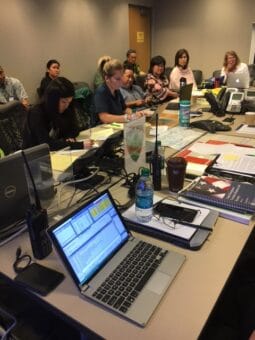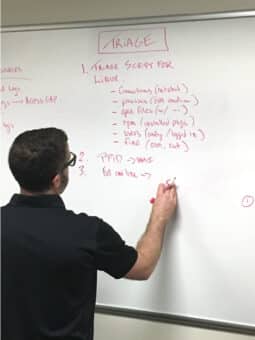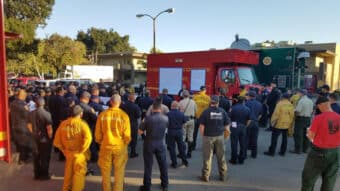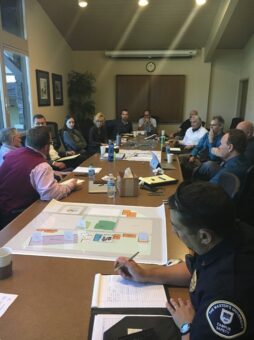Managing ICS as the Incident Commander
by Roger Mason PhD
Introduction
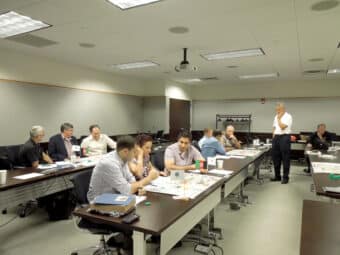
Incident Commanders with years of experience in public safety will instinctively understand what needs to be done and the best way to manage ICS. This article is for persons who have limited experience but may be thrust into this role. In this article we will review some of the starting positions for Incident Commanders, explore your priorities, discuss time management, and review some common problems.
Being an Incident Commander is not about perfection. It’s about getting the job done, protecting lives, and ensuring your team members are safe.
Your Starting Position
As Incident Commander, there are three starting positions you may encounter. These positions depend on the time frame of the incident cycle and when you interact with it
First on the Scene
First on the scene means you are one of the first people to arrive at your emergency operations center (EOC). Your job is to assess what has happened, your current situation, and communicate with your team. If the incident is a major event your team members will self-deploy, however if the incident is confined to a single location, they may not be aware it has occurred.
Your priorities:
Preliminary estimate: What has happened?
Prepare to Communicate: Notifying your team and being prepared to inform anyone administratively above you.
Get Organized: Start to organize your team members as they arrive.
Prepare for the Next Step: Getting ready for the first Incident Action Plan (IAP).
 First OP
First OP
The acronym OP stands for Operational Period. The operational period is a designation of a distinct time period when operations will occur. You have arrived at the EOC, and your team members have already begun some of the preliminary organizational tasks. Your job is to take over managing these tasks and assign people to accomplish them. It is important to get the first Incident Action Plan. The IAP helps to focus the response and initiates an ongoing planning and action cycle
Your Priorities
Situational Assessment: You know something bad has happened. Where do things stand at this moment?
Tasking Evaluation: Who is doing what? What has been accomplished?
Preparing for the IAP: Making sure you are preparing an incident action plan.
Takeover
The term takeover refers to taking over the position as Incident Commander at the start of the next operational period. The nature of the takeover will vary depending on the disaster. If the incident is very serious, you may be operating your EOC on a 24-hour basis. If it is less serious, you may not need to operate overnight. The takeover occurs when your operational period ends and the next operational period begins.
Your Priorities
Situational overview: What is happening right now?
Review the previous IAP: What did the prior team attempt to accomplish in the last operational period?
Ensure Team Assignments: Make sure you have all the people you need to get the job done.
Your Tasking Order
In the US military, the term tasking order is used to inform subordinates what the mission is and what their part will be in accomplishing it. For a civilian Incident Commander, the tasking order refers to what your tasks are and in what order they should be accomplished. Depending on the situation tasks may change, but the following tasks should be a priority.
Preliminary Intelligence Estimate
This means always knowing what is happening. During a major disaster, there will always be uncertainty. You may not have all of the facts, but the Incident Commander should be the most informed.
 Managing Your Team
Managing Your Team
Your job is to manage the incident, not to become involved in tasks. This means ensuring you have every position assigned to a specific person, and they have the support to accomplish their tasks. Your job is not to do their job but to oversee and manage the incident.
Maintaining a Schedule
The Incident Commander must always have his eye on the clock. FEMA developed the National Incident Management System (NIMS). An essential part of the system is using ICS and developing a recurring incident action plan. These functions are designed to be repeated on a periodic basis. This requires watching the clock so things are happening in a timely manner. One of the easiest ways to disrupt your EOC is to ignore the clock resulting in operational delays and planning conflicts.
Managing Time
Managing time is one of the most important jobs of the Incident Commander. Effective time management is critical to effective operations management. A critical incident will not wait while you develop the perfect solution. The ideal solution is meaningless if the opportunity to employ it has passed. You need to set the operational clock, manage the IAP flow, handle the communications tempo, and avoid distractions.
The Operational Period: Setting the clock
Setting the clock means developing a schedule for planning, communications, and operations. The schedule is dependent on the contingencies of the incident and the decisions of the Incident Commander. Having a schedule provides structure to the incident response. Maintaining the schedule is critical. If your mid-level leadership is expecting a morning briefing by 9 AM it is important that it occurs.
A simple way to set the clock is to determine the parameters of your operational periods. FEMA defines an operational period as “The period of time scheduled for execution of a given set of tactical actions as specified in the Incident Action Plan. Operational Periods can be of various lengths, although usually not over 24 hours.”
Typically, operational periods are set based on the incident contingencies and the available staff. Operational periods usually follow staffing availability. If staffing is limited or you need additional help you may have personnel divided into 12-hour periods. If you have adequate staff, you may choose 8-hour periods. Whatever time period you chose, everything must occur within its boundaries (IAP, staff briefings, press statements). By establishing this routine, you maintain your operational momentum.
IAP Flow
An essential regulator of time within ICS is the Incident Action Plan (IAP). The incident action plan follows the operational period. At the start of an operational period you begin the new IAP. During the next 8-12 hours (your operational period), you evaluate results and modify the IAP as necessary.
 Communications Tempo
Communications Tempo
Communication is critical to managing an incident. Without proper oversight and effort, the communications piece can get out of hand. The first step is to have a message ready. It should explain what has happened and what you are doing. You do not need to provide exhaustive details. Secondly, communication needs to be on a regular basis.
When you set up your operational periods set some communications milestones. When the press is hounding you for information you can tell them, “Our next update with be at 4PM.” The unspoken meaning is, “Don’t bother to call because we have nothing for you until 4PM.” When it’s 4 PM your team must be ready to provide an update. If you set a deadline and miss it your credibility will begin to disintegrate.
You also need regular updates for your staff throughout your organization. The more they are aware of what you are doing the more confidence they will develop. This will also limit repeated inquiries regarding what is happening.
Communications must also move upwards to the next level of decision makers. Executive level decision makers are responsible for policy and organization wide decisions. They should not be engaged in problem solving in the EOC. They do need to know what is happening. A simple way to keep them informed is to send them the same materials you are posting on your EOC briefing board. As Incident Commander you will need to supplement this, but the periodic updates will help keep your superiors informed.
Avoiding Distractions
Several years ago, I was asked to assess a corporation’s crisis management procedures. The first thing I noticed was the main phone in the emergency operations center was going to be answered by the CEO. The most important executive decision maker was assigned to a task that could be easily managed by a junior employee. To effectively manage ICS, you need to avoid distractions.
Employing Filters
A filter is something between you and the chaos of a critical incident. An open-door policy might be satisfactory for daily operations, but it does not work during a critical incident. Consider having a single person answer the phone and take messages. If it requires an immediate response, have your most capable assistant answer it. If people come to the EOC have a gatekeeper to determine who gets in to see you. If you take every call and greet the walk-in traffic, you will compromise your effectiveness.
Posting Latest Information
One of the biggest time wasters in an EOC is dealing with people looking for the latest information. Keep the latest IAP and press statements posted. When someone asks “Hey, what is going on?” direct them to the update board.
Hazards
There are four hazards that an Incident Commander should be aware of.
Prioritizing
One of the hardest things for an inexperienced emergency manager to manage is prioritization. In the middle of a critical incident, there will be many voices crying out for your attention. It is easy to focus on the loudest voices. As problems pileup, it can be difficult to know what should be addressed first. Here is a simple formula to help Incident Commanders prioritize their attention.
- What is the greatest threat to life?
- What solution will impact the greatest number of needs?
- Are we ready for the next step in our time-sensitive process? (Ex: IAPs, briefings, public statements etc.)
By following these three things, you will ensure the greatest threat to life is addressed, the greatest number of problems are resolved within your resources, and you are maintaining your operational schedule.
Failure to Watch the Dashboard
Failing to watch the dashboard means you are failing to scan across the ongoing processes and operations to determine their effectiveness and look for shortfalls, As Incident Commander your focus must be divided between the horizon where you are going and the present to determine your operational effectiveness. You are the only person in the ICS structure responsible for both.
 Diving into Problem Solving
Diving into Problem Solving
As Incident Commander it is tempting to dive into solving problems. You must remember this is not your job. Your section chiefs are responsible for their sections. The problems at your level of authority will go unresolved if you get into the weeds trying to fix your subordinate’s issues.
Target Lock
Target lock is a term coined by fighter pilots. It refers to the problem of becoming so focused on a target you become oblivious to other threats. These are threats that have the capacity to destroy you. You should be aware of emerging threats but not allow them to monopolize your attention.
Practical Tips
Here are some simple tips that will improve your performance as an Incident Commander.
- Be Methodical: You know the task flow within your operational periods. Consider adding some tasks unique to your position. They might include doing a short one on one discussion with each of your ICS section chiefs. Quickly review their priorities and evaluate their resource needs. This will help you to stay in touch with what is happening and help to oversee the preparation of the next IAP.
Periodically reviewing the incoming call log is also valuable. This will help you to evaluate if you have missed an important communication and get a feel for the incoming communications flow. Be prompt in answering communications that you must address.
- Keep an Incident Diary: This is not a continuous written summary of what you are doing. It is a place to record reminders and brief details about what is happening. This removes the necessity of recalling every item and helps you to stay on top of what you need to be doing.
- Be Ready for Your Handoff: At the end of your operational period you will be handing off your position to one of you peers. Have everything ready for them to take over. Be ready to brief them so they are set for success.
 Summary
Summary
Serving in a role as difficult as Incident Commander is daunting for anyone. It is even more difficult if you have limited experience. By establishing a tasking order, managing your time, and avoiding distractions you will improve your performance. Your job is not to discover the perfect solution to every problem. The job of the Incident Commander is to manage an organization that develops workable solutions.
I like the famous quote by President Theodore Roosevelt. “In any moment of decision, the best thing you can do is the right thing, the next best thing is the wrong thing, and the worst thing you can do is nothing.”

